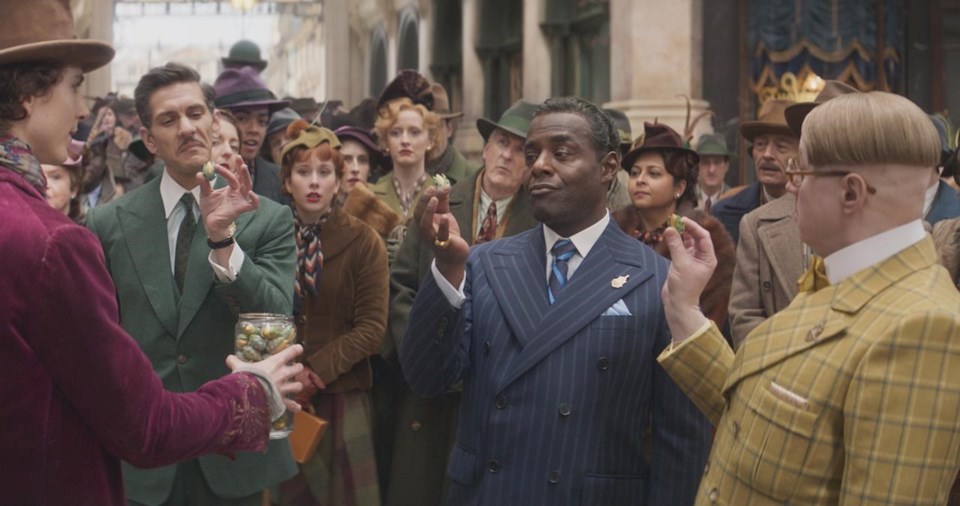The original 1971 “Willy Wonka and the Chocolate Factory” may have been a delicious dream, lined with trees of gumballs and fields of lollipops. But never has there been a more cautionary tale about the danger of too much of a good thing.
Magical as that Roald Dahl-scripted film was, it remains lodged in our imaginations less for its sugary goodness than the way darkness, satire and even mania ebb around its edges — flowing down that nightmarish watery tunnel and pooling somewhere in the back of Gene Wilder’s eyes. Charlie Bucket and Grandpa Joe may bubble with laughter all the way up the ceiling, but there’s a spinning metal blade up there.
“Wonka,” the , bears no such danger. It’s going more for the taste of an Everlasting Gobstopper — an ingenious confection that piles flavor on top of flavor. Tasty though that can be, you miss the daring of Dahl in the more wanly whimsical “Wonka.”
Still, the movie has two big things going for it: the charisma of its winning star, Timothée Chalamet, and the dazzling designs of its director, Paul King, the don of “Paddington.” To a large degree, King has applied much of the formula that defined “Paddington” — and that “Godfather Part II” of sequels, — to a Wonka origin story that populates a delightfully detailed world with a delightful array of supporting characters (many of whom are “Paddington” veterans). Did I say it's delightful?
Yet it's that strain to delight that keeps “Wonka” from achieving liftoff. King's film is lively but too neutered to do Dahl justice; congenial but not clever enough to match the giddy joy of “Paddington 2." If Tim Burton’s 2005 film, with Johnny Depp giving Wonka a Michael Jackson spin, leaned into creepiness, “Wonka” goes the opposite direction.
And you might fairly wonder: What’s so wrong that? Who doesn’t want a cynicism-free, candy-colored charm overload? “Wonka” may be too much of a good thing, but for many (particularly kids) it will surely, well, delight. Even for a movie predicated on retooling IP, “Wonka” comes across as remarkably sincere in its feel-good aspirations.
In the film’s opening scenes, Willy (Chalamet) breezes into a frigid, unnamed European-styled city, singing “I’ve got nothing to offer but my chocolate and a hatful of dreams.” He arrives like a too-confident traveling salesman, eager to sell his chocolate to the world.
Immediately fleeced of his few coins, Willy sets down on a bench for the night and pulls a candle out of his hat that he lights with a gentle blow. He's offered a bed for the night at inn. There, the innkeeper Mrs. Scrubit (Olivia Colman) and her henchman Bleacher (Tom Davis) trap needy drifters into years of indentured labor with elaborate contracts.
This Wonka can't read, a twist that I doubt Dahl would have endorsed, given how much, for him, reading and imagination were intertwined. Before Willy has even gotten started, he finds himself imprisoned with a handful of other similarly misfortunate souls, including the young Noodle (a very natural Calah Lane).
But inspired by his late mother (Sally Hawkins, seen in tender childhood flashbacks), Willy isn’t much daunted in his dream to open a shop alongside other candy makers in the Galeries Gourmet. He manages to escape repeatedly to dazzle customers with chocolates of exotic ingredients before slipping through manhole covers to make a getaway, like
Sensing the potential power of Wonka’s enchanting chocolates (some cause levitation), the monopolizing local chocolatiers — Slugworth (Paterson Joseph), Prodnose (Matt Lucas) and Fickelgruber (Mathew Baynton) — band together to squash Willy with the aid of a chocolate-addicted police chief (Keegan-Michael Key), whose waistline expands throughout the film.
That bit, like most others in the film, doesn’t quite land despite the good cheer it’s delivered with. “Wonka” assembles a wide array of top-notch comic actors — not only Key and Colman but Hugh Grant as an Oompa Loompa; Simon Farnaby (who co-wrote the script with King) as a security guard, mirroring his “Paddington 2” cameo; and Rowan Atkinson as a corrupt priest.
But most of the jokes in “Wonka” are as memorable as its songs. The gag of Grant, the “Paddington 2” MVP, smothered in orange makeup and green hair as a proudly debonair Oompa Loompa, is never quite as clever as the movie thinks it is. (On the press trail for the film, Grant has been )
Neil Hannon’s songs are generic, but Chalamet sings them well. When a few notes from Leslie Bricusse and Anthony Newley’s “Pure Imagination” float by, they only serve as a reminder to how much better the tunes were in the original.
I may be being too hard on “Wonka.” This is an eminently pleasant movie, propped up by its indefatigable good cheer and King's immaculately tidy craftsmanship. The costumes (Lindy Hemming), cinematography (Chung-hoon Chung) and, in particular, the ingenious production design (Nathan Crowley) craft a wonder-filled backdrop. A film doesn’t need scenery this good for Chalamet to carry it. His Wonka is simpler and brighter than Wilder’s, more a figure of pure optimism, like Paddington.
But we’ve also had some exemplary Dahl adaptations lately that didn’t forget that worlds of imagination come alive when the cruelties of life and of childhood aren’t just paid lip service. (Veruca Salt or Mike Teavee, for instance, wouldn’t fit anywhere in “Wonka.”) I’m thinking of Wes Anderson’s inventive , released this fall on Netflix, and Matthew Warchus’ terrific from last year. “Wonka” is a more mixed addition: More tailored for kids yet less about childhood.
“Wonka,” a Warner Bros. release, is rated PG by the Motion Picture Association for “some violence, mild language and thematic elements.” Running time: 116 minutes. Two and a half stars out of four.
___
Follow AP Film Writer Jake Coyle at:
Jake Coyle, The Associated Press




